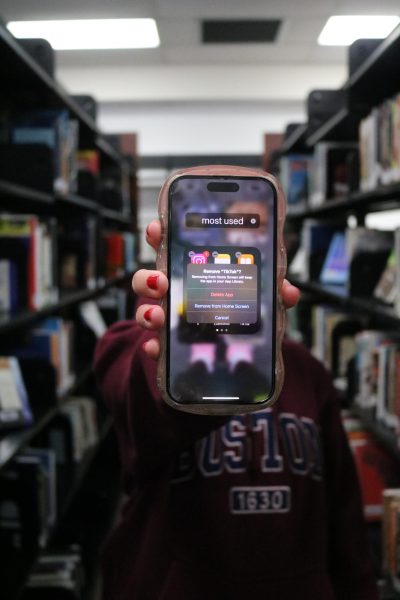District 128 facilitated first-ever electronic learning day in February

In late January, the Midwest was wracked with life-threatening temperatures and wind chills, including Lake County and Libertyville. Many school districts, including District 128, cancelled school for several days for the safety of students.
The District 128 administration instituted an electronic learning, or e-learning day, on Monday, Feb. 18, to compensate for the snow day not already allotted for in the schools’ schedules.
This year, there have been four emergency days when school for Vernon Hills High School and Libertyville High School was cancelled due to inclement weather. Keeping in mind the Illinois legislation that dictates the number of required school days, the district’s calendar committee decided to institute an e-learning day because the committee already has three built-in emergency days that go beyond what legislation deems necessary.
The first cancelled day was the Monday after Thanksgiving, due to snow. The other three days — one due to snow and two because of cold — were during the week of January 28 during the polar vortex in Chicago that affected areas surrounding the city, including Libertyville. According to AccuWeather.com, a polar vortex is “a large pocket of very cold air, typically the coldest air in the Northern Hemisphere, which sits over the polar region during the winter season.”
In previous years, a make-up school day was specified as a day with students in the building for a minimum of five hours. This year, however, schools were permitted by the state to have e-learning days, when students do not have to be in the building but rather receive online assignments from their teachers that would equate to a regular school day.
The options the district considered included an e-learning day, a student-attendance day on Monday, Feb. 18, or eliminating the teacher grading day at the end of the semester to account for the extra snow day. The Feb. 18 date was already set aside as a non-attendance day for students and a teacher institute day.
“My role related to the e-learning day was in recognizing that we needed to make up a day, and also recognizing the various pros and cons of the options that we had,” explained Dr. Rita Fischer, the assistant superintendent for curriculum and instruction with the district and the head of the calendar committee.
With much consideration, the calendar committee sorted priorities for teachers and students alike.
“We felt like the best option of student learning and the continuation of student learning was to try this new e-learning opportunity because we really value teacher professional learning, and that’s what the Institute Day is set aside for,” stated Dr. Fischer.
For many teachers, the Institute Day was beneficial, and having a day to meet and collaborate with others was useful.
“Personally, I do think that my Institute Day was well-spent, and I’m grateful for that day,” stated English teacher Mr. Ryan Ebling. “Having e-learning was like [having] Institute Day but now we also [had] to have an extra thing that we were keeping an eye on, which made the day feel a little bit more overloaded than it would have otherwise.”
Some students were initially apprehensive for the e-learning day and what it would entail.
“I didn’t want to go to school because it was already our day off, but I also didn’t like the idea that all the assignments were supposed to take up to 45 minutes,” expressed junior Kiley Nolan. She stated it was a relief when her assignments didn’t take her nearly as long as she had thought, and sleeping in was a major benefit.
“It [wasn’t] like you have to sit down for the entire day like if you were at school, and so I prefer [e-learning] definitely over having to go to school,” Nolan added.
An additional benefit to the e-learning day, Dr. Fischer added, is that it allowed for flexibility for students whose families planned vacations, college visits or any other kind of event scheduled for a day that was originally supposed to be a non-attendance day for students.
The types of assignments that students received were largely up to their specific teachers. Educators were required to share their e-learning assignment with students by 8 a.m. on Feb. 18. Teachers were encouraged to share documents prior to Monday so students with fixed schedules could work over the weekend. To take attendance, students were required to fill out a Google form sent out via email.
Reflecting on the e-learning day, for some teachers and students there was miscommunication.
“[The day could be improved] with a little bit more clarity on what we can and can’t assign, or expect of our students, that our students were kind of aware of the expectations that [they] will be spending this day doing course work,” Mr. Ebling suggested. He stated it was a sufficient alternative to having school on the Institute Day, but that another possible solution could be sending out work to students the day of a snow/cold day.
“That way the flow of the week wouldn’t be as interrupted as it was when we had three snow days,” Mr. Ebling added.
For the most part, according to Mr. Ebling, the day went smoothly and was a reasonable solution to a difficult issue.
“Our recommendation for students is to really recognize that this is meant to be flexible,” emphasized Dr. Fischer. “If there are any issues for [students] regarding the e-learning day, [they should] communicate first with their teachers and make sure that they understand what the expectations are and that they’re able to fulfill them.”



![Mr. Abullh Ali, manager/assistant, helps open Queen Yemeni Coffee in downtown Libertyville at 606 North Milwaukee Ave. With the help of employees such as manager and LHS senior Yousef Taha, they are able to bring the Yemeni and Ethiopian culture to Libertyville by using their Queen spices, cinnamon and cardamom in their drinks such as Adani Chai, which is inspired by Sheda, the Queen of Yemen and Ethiopia. “The history of our coffee [is] a long history and we believe that Yemen and Ethiopia started the coffee and we are bringing something unique to the community,” Mr. Ali said.](https://www.lhsdoi.com/wp-content/uploads/2025/04/Photo-1-600x400.jpg)



